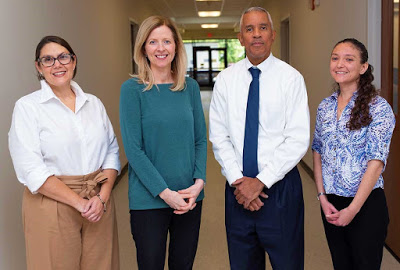At Hofstra University, we have found that new college parents and family members are eager to hear and learn from our counseling professionals on appropriate parenting as their children transition to college. Dr. Merry McVey-Noble, assistant clinical director of Student Counseling Services at the Student Health and Counseling Center, Hofstra University explained to families in our workshop, How to Mentor Your Emerging Adult, that asking good questions is a great start. Here is some of her advice to parents:
Before you ask anything - be radically genuine; tell them the truth about why you’re asking. It’s ok to say, “I don’t even know exactly what to ask you.” “This might be just my anxiety.” “I want to know if you’re ok and I don’t want to be too intrusive or not intrusive enough…
Instead of saying: “You should/should not…” consider asking “Is it wise to/not to…?” “Are you prepared to deal with the consequences of…?” (e.x. You can choose to put your work off for as long as you want and to do it as last minute as you want. My nagging has no power over you anymore. However, how stressed are you willing to feel and what the penalty is for handing an assignment in late. Are you emotionally prepared if that happens? Not that it will, but if it does.”
Ask them how they think others (the target ‘audience’ they are hoping to reach - if they are not sure, help them clarify) might perceive their actions. Will they have the desired effect? What other ways might others perceive your student’s actions? Are your students ready to deal with intended and unintended reactions (you can brainstorm some of these that might be obvious to you, but that they might not see)?
Ask: “Do you think that’s wise?” instead of saying “don’t.” Try not to ask it with an air of disapproval, but more like, “do you think that your choice conveys the wisdom I know you have?”
When they tell you of their choice, encourage them to be proud of having made an independent decision. Ask: “Do you like your choice?” to make sure that they are taking ownership of it. Remind them that we don’t always like our choices and that if we don’t there are ways to deal with it. It’s also important to MAKE a choice rather than being paralyzed by the fear of not liking it and getting stuck on making the perfect choice.
Procrastination: Ask them to estimate how long they think certain things will take. If you’re upset because they say they haven’t started X, and you know how they work, ask them to estimate how long it will take. Remind them that we generally, you included, are notorious under-estimators of how long things take.
Ask specific questions. Ask them what they’ve been liking, food-wise, where they’re eating, instead of just asking “Are you eating?” Try not to be fixated on the Freshman 15. If they express concern about food choices, we have a nutritionist on campus associated with Dining Services.
Ask them not if they’re sleeping, but how they’re sleeping.
Ask if they are getting stuck in any way, if they feel like they need a hand with anything and let them talk about it. Just listen and gather the data. Ask if they would like a hand. Let them know that they can get assistance and that you can talk through a plan for them to help contact who they need to to get it done.
Ask them how they’re getting along with other students in their room/suite.
Let them know that you are new at this too, that you love them and want to be present for them in the new ways that they need you to be, but that you might not be sure how. Be as genuine about that as you can be.
Parents and families told us that Dr. McVey-Noble’s advice was helpful and made them calmer. Their students’ first year in college is a new milestone in those families’ lives. Parents love learning new strategies on becoming mentors rather than managers for their college-aged children.
 This is Hofstra University’s Student Counseling Center staff. Dr. Mc-Vey Noble is first on the left.
This is Hofstra University’s Student Counseling Center staff. Dr. Mc-Vey Noble is first on the left.




